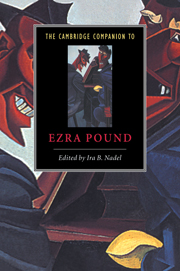Book contents
- Frontmatter
- 1 Introduction Understanding Pound
- 2 Pound and the making of modernism
- 3 Early poetry 1908-1920
- 4 Early Cantos I-XLI
- 5 Middle Cantos XLII-LXXI
- 6 Late Cantos LXXII-CXVII
- 7 Beyond The Cantos
- 8 The texts of The Cantos
- 9 Pound as critic
- 10 Pound as translator
- 11 Pound and the visual arts
- 12 Pound and music
- 13 Pound's politics and economics
- 14 Pound, women and gender
- 15 Pound and antisemitism
- Further reading
- Index
12 - Pound and music
Published online by Cambridge University Press: 28 May 2006
- Frontmatter
- 1 Introduction Understanding Pound
- 2 Pound and the making of modernism
- 3 Early poetry 1908-1920
- 4 Early Cantos I-XLI
- 5 Middle Cantos XLII-LXXI
- 6 Late Cantos LXXII-CXVII
- 7 Beyond The Cantos
- 8 The texts of The Cantos
- 9 Pound as critic
- 10 Pound as translator
- 11 Pound and the visual arts
- 12 Pound and music
- 13 Pound's politics and economics
- 14 Pound, women and gender
- 15 Pound and antisemitism
- Further reading
- Index
Summary
I am glad you have got your voice, or part of it back. I have the organ of a tree toad, fortunately, for if I had ever been able to sing “My Country tiz of Theeee, ” without going off the key four times in each bar, I shd. have warbled & done no bloomin' thing else - che peccato and wot a loss to litterchure.
(P/J, 65)This is Ezra Pound to his friend James Joyce, who was a singer with, by some accounts, the potential for a career as such. On the other hand, all accounts of Pound's voice are pretty well in accord with his own jocular assessment - raucous, nasal, a scratchy phonograph. Recordings bear this out. When we say someone has a beautiful voice we usually mean a speaking or singing organ of great resonance, power, suppleness, freedom, range, capable of an infinitude of nuance, a strangely affecting Gestalt through which we experience a thrill akin to the sensation of flight. But there is another kind of voice than the merely frequency producing one, another kind of singer than the paragon of high notes - certain poets, who, either naturally, or by acquisition, have the ability to compose words which prescribe the voice which should utter them, poets with an “ear,” poets who never separate word from sounding tone and the percussive rhythm of consonants.
- Type
- Chapter
- Information
- The Cambridge Companion to Ezra Pound , pp. 236 - 248Publisher: Cambridge University PressPrint publication year: 1999
- 1
- Cited by

